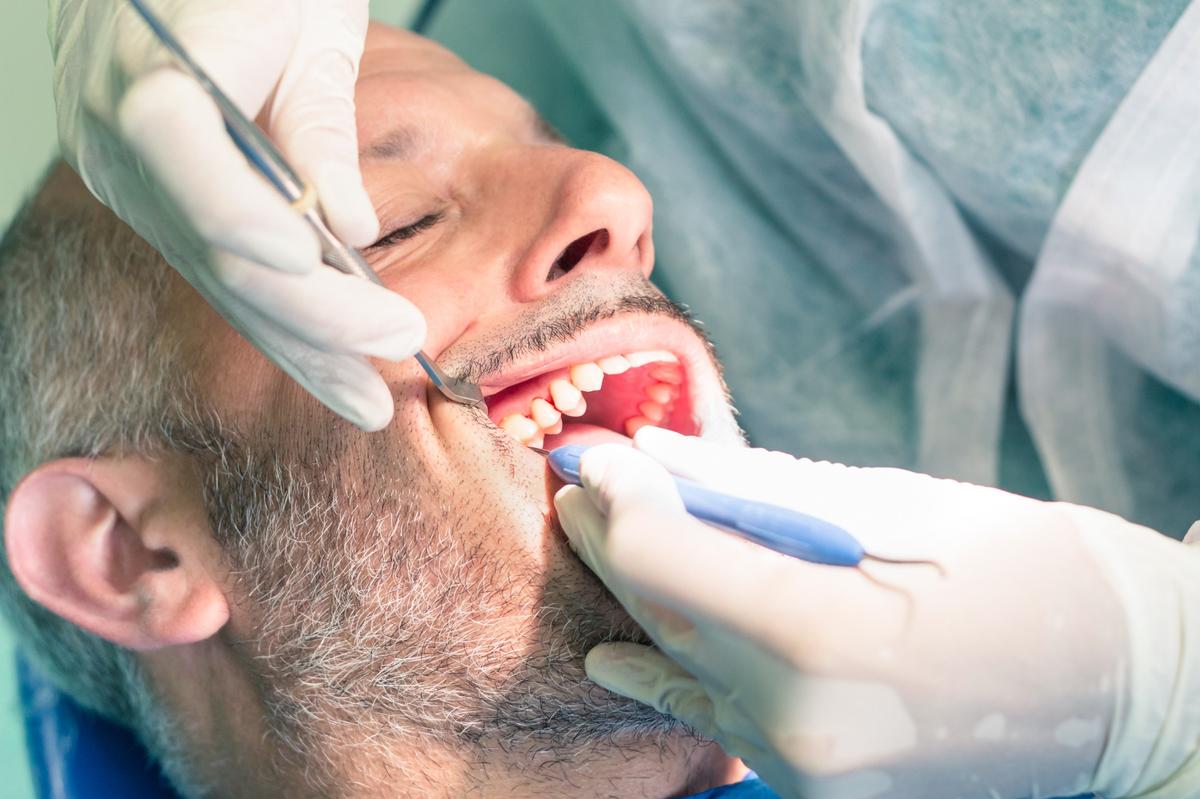Top Reasons for Tooth Sensitivity and How to Fix It
Discover the common causes of tooth sensitivity and learn effective home remedies and professional treatments to fix it.

Discover the common causes of tooth sensitivity and learn effective home remedies and professional treatments to fix it.
Tooth sensitivity can be a real pain, especially when you're trying to enjoy your favorite foods and beverages. Whether it's a sip of hot coffee or a bite of ice cream, the sudden jolt of discomfort can be alarming. Tooth sensitivity affects millions of people and can make even the simplest activities, like brushing your teeth, unpleasant.
This condition occurs when the protective outer layer of your teeth, known as enamel, becomes worn down or when gum recession exposes the underlying dentin. Dentin is the part of the tooth that connects to the nerves, making your teeth sensitive to temperature changes, sweet or acidic foods, and even cold air.
Understanding the reasons behind your tooth sensitivity is crucial for finding the right solution. From simple home treatments to professional dental care, there are several ways to manage and even prevent tooth sensitivity, allowing you to enjoy your meals and maintain oral health comfortably.
Understanding the reasons behind tooth sensitivity is the first step to managing it. Several factors can lead to the discomfort you feel. One common cause is enamel erosion. This happens when the hard, protective layer on your teeth wears away due to acidic foods, aggressive brushing, or grinding your teeth. Without this layer, your teeth become vulnerable to temperature changes and other irritants.
Gum recession is another major cause. When gums recede, they expose the dentin, the softer part of the tooth that leads to the nerves. This exposure makes your teeth more sensitive to hot, cold, sweet, and acidic foods. Other dental issues like cavities, cracked teeth, and worn fillings can also contribute to sensitivity. These problems expose the dentin and make your teeth more reactive to stimuli.
Certain dental procedures, like teeth whitening, can temporarily cause sensitivity as well. The chemicals used in these treatments can affect the enamel and dentin, leading to short-term discomfort. It's important to consult with your dentist to pinpoint the exact cause of your sensitivity and find the appropriate treatment.
If you're dealing with tooth sensitivity, there are several home remedies you can try to find relief. One of the simplest methods is using a toothpaste designed for sensitive teeth. These toothpaste formulas contain compounds that help block the pathways to the nerves, reducing sensitivity over time. Use it as part of your daily brushing routine to see improvements.
Another effective home remedy is using a soft-bristled toothbrush. Hard-bristled brushes can wear down your enamel and cause gums to recede, both of which increase sensitivity. Switch to a soft-bristled brush and be gentle while brushing to protect your teeth and gums.
Saltwater rinses can also help. Gargling with warm salt water not only cleans your mouth but also acts as an antiseptic that can reduce inflammation and discomfort. Mix a teaspoon of salt in a glass of warm water and rinse your mouth for about 30 seconds, twice a day.
Lastly, avoid acidic foods and drinks like citrus fruits, soda, and wine, which can erode your enamel and worsen sensitivity. Eating a balanced diet and drinking plenty of water can help maintain your oral health and reduce sensitivity issues.
If home remedies aren't providing enough relief, it might be time to consider professional treatments for tooth sensitivity. One effective treatment is fluoride application. Dentists can apply fluoride varnish to the affected teeth, which helps strengthen enamel and reduce sensitivity. This simple treatment creates a barrier on your teeth, protecting them from temperature changes and acidic foods.
Another option is dental bonding. For exposed root surfaces due to gum recession, your dentist can apply a bonding resin to cover the exposed dentin, shielding it from sensitivity triggers. This procedure is quick and can significantly reduce discomfort.
For more severe cases, your dentist might recommend a root canal. This option is usually considered when the sensitivity is caused by deep decay or an infection that has reached the tooth’s nerve. A root canal removes the damaged nerve, eliminating sensitivity and preserving the tooth.
Periodontal treatments might also be necessary if gum disease is causing your sensitivity. Treating the underlying gum issues can help cover exposed roots and reduce sensitivity. Consulting with your dentist to identify the best treatment tailored to your condition is crucial for effectively managing tooth sensitivity.
Preventing tooth sensitivity requires a combination of good oral hygiene practices and lifestyle choices. Start by brushing your teeth twice a day with fluoride toothpaste. Fluoride helps strengthen tooth enamel, making your teeth less prone to sensitivity. Use a soft-bristled toothbrush and gentle strokes to avoid damaging your gums and enamel.
Floss daily to remove food particles and plaque from between your teeth and along the gumline. This prevents gum disease, a leading cause of exposed dentin and sensitivity. Regular dental checkups are essential for keeping your teeth and gums healthy. Your dentist can spot early signs of enamel erosion or gum recession before they become major issues.
Watch your diet to help prevent sensitivity. Limit acidic foods and drinks, which can wear down your enamel over time. Instead, choose foods high in calcium, such as milk, cheese, and yogurt, to help strengthen your teeth. Staying hydrated by drinking plenty of water also helps wash away food particles and bacteria that can harm your teeth.
Lastly, avoid habits that can contribute to tooth sensitivity, such as grinding your teeth or chewing on ice. If you grind your teeth at night, consider wearing a mouthguard to protect your enamel. With these steps, you can keep your teeth strong and free from sensitivity.
Tooth sensitivity can be a bothersome issue, but understanding its causes and finding effective remedies can help you regain comfort and confidence. From common causes like enamel erosion and gum recession to professional and home treatments, there are numerous ways to address and prevent tooth sensitivity.
Taking proactive steps, such as maintaining good oral hygiene and making smart dietary choices, can significantly reduce the risk of developing this condition. Regular visits to your dentist are also crucial for early detection and management of any underlying issues.
If you’re struggling with tooth sensitivity, don’t wait to seek help. Schedule an appointment with Elite Dental Wellness’ team of affordable dentists in Houston, Texas, for personalized care and effective solutions!

Cosmetic dentistry isn’t a single procedure—it’s a custom plan that blends treatments for color, shape, and alignment. At Elite Dental Wellness, our Cosmetic Dentistry menu includes veneers, Lumineers, professional teeth whitening, and orthodontics with clear aligners or braces. Here’s how we combine them to create a smile that fits your lifestyle.

Once placed, a dental bridge should feel like part of you—stable for chewing, natural in photos, and simple to clean. This guide covers daily care, what to expect as you adapt, and small habits that help your bridge look great for years.

After placing veneers, the right routine keeps edges smooth and color consistent. As we emphasize in our patient education, brushing your veneers just as you would natural teeth is essential. Even though porcelain or ultra-thin options like Lumineers aren’t natural enamel, they still need regular cleaning to maintain shine and keep surrounding gums healthy.

A dental bridge replaces a missing tooth with a lifelike “pontic” anchored to strong neighboring teeth. As part of our Restorative Dentistry services, bridges restore chewing comfort and help prevent neighboring teeth from drifting into the space. Here’s how we plan them, when they make the most sense, and how to care for them day to day.

If you’re dreaming of brighter teeth, smoother edges, or a more balanced smile line, veneers can get you there with precision. At Elite Dental Wellness in Houston, we offer porcelain veneers and Lumineers—both designed to refine color and shape while keeping tooth structure conservative. This guide explains when veneers make sense, how porcelain and Lumineers differ, and exactly how we plan results that look believably natural in real life (not just in photos).

If you’re missing a tooth—or many—dental implants can restore the look, feel, and function of a natural smile. At Elite Dental Wellness in Houston, implants are part of our core restorative services and can support single-tooth crowns, multi-unit bridges, and full-arch solutions. This guide explains the options, the clinical steps from planning to restoration, and the everyday care that helps implants last.

If a tiny chip catches the light in every photo—or a narrow gap steals attention—dental bonding can deliver a subtle, natural-looking upgrade in a single visit. Using a tooth-colored resin, we reshape edges, mask stains, and refine symmetry without aggressive drilling or long recovery. For many Houston patients, bonding is the simplest way to love their smile again.

Oral cancer doesn’t always announce itself. Sometimes it looks like a small sore that lingers; other times, it hides under the tongue or along the cheeks with little pain. The good news is that oral cancer screening is quick, comfortable, and included in comprehensive exams at Elite Dental Wellness. Because early detection dramatically improves outcomes, this simple step belongs in every Houstoner’s health routine.

When a tooth can’t be saved, a well-planned tooth extraction is the first step toward comfort and future restoration. Recovery is usually straightforward—especially when you know exactly what to do (and what to avoid). Use this guide to protect the blood clot, minimize discomfort, and get back to normal quickly.

If it’s been a while—or you’re simply changing offices—your new patient exam sets the tone for everything that follows. We focus on clarity, comfort, and a realistic plan that fits your goals and calendar. Here’s what to expect at your first visit with Elite Dental Wellness, from imaging to financial transparency.

Porcelain veneers are a favorite for patients who want brighter color, refined shape, and a harmonious smile line—often in just a couple of visits. If you’re exploring veneers in Houston, here’s exactly how the process works, what temporaries feel like, and how to keep your results glowing for years.

If your hygienist has recommended a deep dental cleaning—also called scaling and root planing—you may be wondering what it is, why you need it, and how it feels. Think of this treatment as a “reset” for your gums. Plaque and hardened tartar (calculus) beneath the gumline act like splinters; until they’re removed, irritation and bone loss can progress. This guide explains the process step by step so you can walk in confident and walk out on a healthier path.

If multiple teeth are failing or already missing, you don’t have to settle for a loose denture. Modern full-arch solutions let you smile, speak, and eat with confidence. This guide compares All-on-4 fixed bridges, implant-retained (snap-in) dentures, and traditional dentures so you can choose what fits your lifestyle and budget.

A dental crown restores strength, shape, and appearance when a tooth is too damaged for a simple filling. Whether you’ve cracked a molar on a tortilla chip or have a large old filling that’s failing, crowns can protect your tooth for the long run—without compromising your smile.
.jpg)
Bleeding when you floss is common—but not normal. Gum disease (periodontal disease) starts quietly and can lead to tender gums, bad breath, shifting teeth, and bone loss if left untreated. The good news? With early detection and a personalized plan, you can protect your smile for life.
.jpg)
If you’ve ever wondered whether in-office teeth whitening or take-home whitening trays are the smarter choice, you’re not alone. Many Houston patients want fast, safe, and long-lasting results—but with so many products and promises out there, it’s hard to know which path fits your goals, schedule, and budget. This guide breaks down how each option works, what results you can expect, and how to keep your smile bright for the long haul.

A missing tooth can affect chewing, speech, and confidence—but you’ve got excellent options. In Houston, the most common choices are a dental bridge, a dental implant, or a removable partial denture. Each restores function and appearance differently. This guide compares comfort, cost, timelines, and long-term value so you can choose with clarity.

Wisdom teeth (third molars) often show up in your late teens or twenties. When there isn’t enough room, they can push on neighbors, trap bacteria, or grow sideways. If you’re planning wisdom tooth removal in Houston, this guide covers the recovery timeline, comfort strategies, and when to call us.
.jpg)
Three words, lots of feelings: root canal therapy. Thanks to old myths and movie jokes, many people assume it’s painful or risky. The reality? Modern root canal therapy is a comfortable, routine procedure that relieves pain and saves natural teeth. Let’s separate fact from fiction.

You have a vision—brighter teeth, smoother edges, or a camera-ready makeover. But which cosmetic dentistry treatment gets you there efficiently: veneers, teeth whitening, or dental bonding? This roadmap compares benefits, timelines, and ideal candidates so you can plan your transformation with clarity.

What if 10 minutes a day could help you avoid cavities, gum disease, sensitivity, and surprise dental bills? That’s the power of preventative dentistry. This Houston-friendly checklist turns good intentions into easy daily habits so your next visit at Elite Dental Wellness is swift, stress-free, and—ideally—celebratory.
%20(2).jpg)
Dental implants in Houston are popular because they look, feel, and function like real teeth. Still, most patients have practical questions: How much do dental implants cost? How long does it take?

Dental emergencies don’t book appointments. They happen on game day, during dinner, or right before a big presentation. If you chip a tooth, knock one out, or wake up with severe pain, this step-by-step guide will help you protect your smile until you reach Elite Dental Wellness.

Sharp twinges with cold drinks? A dull ache that flares at night? It’s easy to wonder if root canal therapy is on the horizon. Let’s take a breath and sort it out. The procedure is designed to relieve pain—not cause it—and to save a tooth that’s in trouble. With the right exam and imaging, you’ll know where you stand and whether root canal therapy is truly the best next step.

If a tooth needs repair, how do you choose the right fix without overdoing it—or underdoing it? That’s where dental fillings vs inlays and onlays becomes a practical question. The choice affects strength, longevity, appearance, and cost. The good news: you don’t have to guess. With a clear explanation of dental fillings vs inlays and onlays, you can match the treatment to the size and location of the damage and feel confident in the result.

Have you ever wished your teeth could get a “second chance” after a chip, a cavity, or years of wear? That’s the promise of modern tooth repair—bringing damaged smiles back to health, strength, and natural beauty. This care isn’t just about looks; it’s about comfort, chewing, and confidence. And the best part? Treatment plans can be simple, stepwise, and tailored to your life. With restorative dentistry, that second chance feels within reach.

If you’ve ever wondered how to keep your teeth healthy without complicated routines, you’re in the right place.

There are several reasons why dental implants stand out among tooth-replacement options, let's discuss the benefits.

Explore tips to teach kids good oral hygiene. Learn routines, fun activities, and parental involvement to nurture healthy dental habits for children.

Explore when oral surgery becomes essential for dental health, helping with teeth issues, jaw alignment, and improved oral function.
.jpg)

Explore how orthodontic treatment enhances teens' oral health, boosts confidence, and prevents future dental issues with modern options.

Discover how teeth whitening can boost your confidence. Learn about the process, psychological benefits, and maintenance tips for a bright smile. Read on!



Discover the essential role of baby teeth in speech, chewing, and guiding adult teeth.

Learn about types of dental fillings, their pros and cons, how to choose the right one, and tips for maintaining them effectively.

Discover tips to turn dentist visits into exciting adventures for kids with engaging activities and positive reinforcement. Contact us at Elite Dental Wellness now.


.jpg)
Learn what happens during a dental cleaning. Understand each step from the initial examination to tips for maintaining oral health.

Learn why regular dental visits are crucial for preventing issues, detecting problems early, and maintaining overall health.

Discover essential tips and tricks for caring for your braces. Learn how to maintain good oral health while achieving a perfect smile.

Learn how mouthguards protect your teeth, their types, benefits, and care tips. Essential info for a healthier smile.

Discover ways to relieve a toothache at home and learn when to see a dentist for proper care and treatment.

Discover the best foods for strong teeth, including dairy, fruits, veggies, nuts, and healthy drinks.

Discover simple tips to make brushing fun and effective for kids. Ensure your children develop healthy oral hygiene habits with these easy steps.

Learn how to keep your smile bright and healthy with daily habits, nutrition tips, and regular dental check-ups for all ages.

Discover the common causes of tooth sensitivity and learn effective home remedies and professional treatments to fix it.

Learn about urgent dental symptoms: tooth pain, gum issues, visible changes, and infection signs.

Discover how sugar affects your teeth, common sources of hidden sugars, and tips to reduce intake for better oral health.

Learn why flossing is crucial for removing plaque, preventing gum disease, and supporting overall health.

Discover effective ways to prevent cavities, including brushing, diet, dental treatments, and healthy habits.

Learn what to expect during a deep dental cleaning, from preparation to aftercare tips, ensuring optimal oral health. Read on to know more!

In this article, we'll explore why regular dental visits are important, the factors influencing how often you should see your dentist, and the common procedures.

In this article, we’ll discuss five key indicators that you might need to schedule an appointment with your dentist sooner than you think. Continue reading!

This guide aims to simplify the process for you and provide practical tips to make the best choice for your family. Continue reading to learn more about it!

In this article, we will delve into what fluoride is and how it functions, explore its benefits for dental health, identify the common sources of fluoride.

This article will guide you through what to consider, from ingredients and types of toothpaste to label reading and family involvement. Continue reading!

Taking your child to the dentist regularly is one of the most important steps you can take to ensure their health. Continue reading to learn more about this!

From heart disease and diabetes to respiratory infections and mental well-being, the condition of your mouth can have far-reaching effects on your whole body.

Discover the best foods for strong teeth. Learn how nutrition plays a crucial role in oral health. Read on to know more!

We explore daily brushing and flossing techniques, balanced diet, ways to avoid harmful dental habits, and how to use dental products effectively at home.

Discover the expert care at Elite Dental Wellness. Learn about our Houston dentist's qualifications, services, and patient success stories.

Discover the dental implant healing process. Expert insights on recovery and care tips. Explore more on our dental blog!

Discover how dental implants work. Learn about the procedure, benefits, and factors influencing their success for a natural-looking, long-lasting smile.

Explore the world of dental implants in Houston with our comprehensive guide. Learn about the process, benefits, and more. Get started now!

Learn about the revolutionary teeth in a day procedure in Houston. Discover how you can achieve a brand-new smile in just one day.

Whether you've recently moved to a new area or are simply looking to change your current dentist, it can be a challenge to find the perfect match.

This blog delves into the nuances of veneer maintenance, emphasizing the significance of oral hygiene in preserving the longevity and appearance of your veneers.

In this blog, we'll delve deeper into the expected recovery times for various oral surgeries, providing you with valuable insights to help you prepare and plan for your post-operative phase.

In this blog post, we will explore the lifespan of veneers, factors that can affect their durability, and what you can do to make them last as long as possible.

Every now and then, wisdom teeth can create pain and discomfort as they come in. Do you need to see one of the Houston dentists at Elite Dental Wellness urgently to restore your oral health?

The first few days after dental implant surgery are critical for the success of the procedure. In addition to taking some time off to rest and recover, you can also help your body heal faster by paying more attention to your diet. Here's what you should eat after implant surgery to promote healing.

Can you get dental implants if you have bone loss? Keep reading to find out more.

This blog by Elite Dental Wellness will help shed light on the importance of preventative dental care, and how taking proactive measures now can benefit us both in the short-term and long-term future.

Here's why it's important to take good care of your aligners and how to do it properly.

One thing you can do to maintain your teeth whitening is to avoid certain foods and drinks. Read more here!

If you’ve just gotten a new smile thanks to dental implants in Houston, you may be wondering how to care for your new grin. How can you keep your dental implants and your natural teeth healthy?

Welcome to the new and improved Elite Dental Wellness website, where new and returning patients can easily navigate our services, book appointments, and access important information.
%20(1).jpg)
.png)
®2022 Elite Dental Wellness. All rights reserved.
